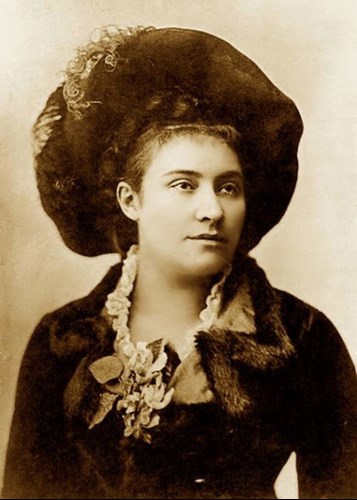Wagner's Favorite Soprano at the May Festival
Each year, singers, conductors, and instrumentalists from around the world travel to Cincinnati for appearances at the May Festival. Such appearances date to the early days of the Festival, and though their names might be unfamiliar today, history tells us that many soloists at those early May Festival performances were world-renowned in their own day.
There is no better example than Frau Amalia Friedrich Materna, who appeared at the May Festival in 1882 and 1884. Frau Materna was the leading Wagnerian soprano of her time. In 1876, at the inaugural Bayreuth Festival, Materna sang the role of Brünnhilde in history’s first complete Ring cycle. In 1882, just months before Wagner’s death, she created the role of Kundry in Parsifal; she repeated the role at several subsequent Bayreuth Festivals.

Her May Festival appearance in 1882 was marked by a versatility of repertoire that seems notable today but was commonplace for the time. The 1882 May Festival opened on Tuesday evening, May 16, and included two concerts each day from Wednesday until Friday. It was commonplace for the featured guest soloists to make several appearances in the week, as Frau Materna did. Here’s Materna’s 1882 May Festival in review:
Tuesday evening: soprano soloist in the first May Festival performance of Mozart’s Requiem, and a recitative and aria from Beethoven’s Fidelio, “Abscheulicher”.
Wednesday afternoon: “E Susanna non vien” and “Dove sono” from Mozart’s The Marriage of Figaro, as well as an unnamed “duo” by Mendelssohn with mezzo-soprano Anna Louise Cary.
Wednesday evening: soprano soloist in Bach’s St Matthew Passion (also a May Festival premiere)
Thursday afternoon: “Brünnhilde’s Immolation” from the end of Götterdämmerung, as part of an all-Wagner matinee
Thursday evening: a night off! (The rest of the soloists were busy singing Schumann’s Scenes from Goethe’s Faust)
Friday afternoon: an afternoon off! (The rest of the soloists were busy with a matinee of operatic delights, and the orchestra with Liszt’s Dante Symphony.)
Friday night: A scena from Weber’s Oberon, “Ocean! Thou Mighty Monster”, and the grand close of the Festival: “The Fall of Troy” from Berlioz’ Les Troyens.
A review in the Cincinnati Enquirer noted that Frau Materna “completely captivated” the audience in her Mozart on Wednesday afternoon. Her performance in the St Matthew Passion was apparently quite affecting, as the unnamed critic noted that she sang the famed aria “Aus Liebe”with “great expression and true feeling.” Materna “…well sustained the reputation she has gained across the Atlantic. Every note she sings is distinct, full and rich, and there is a genuine purity in her intonation which only a genuine artist can possess.”
She returned to Cincinnati in 1884, and brought with her two colleagues from the Imperial Opera in Vienna: tenor Herr Hermann Winkelmann and bass Herr Emil Scaria, both the leading Wagner singers of the day. In a letter to Herr Scaria, addressing Scaria and Frau Materna, Richard Wagner wrote, “You two are my best German singers, whom I can show to all as models of what is most important to me in dramatic singing.”
Frau Materna’s second May Festival, though entirely Wagnerian, was not much lighter than the first,: she sang the role of Elisabeth in a complete performance of Tannhäuser, the Act III finale of Siegfried, and the Love Duet and Liebestod of Tristan und Isolde – all in the span of four days.
She would go on to a successful stint on the roster of New York’s Metropolitan Opera and a distinguished career as a teacher.